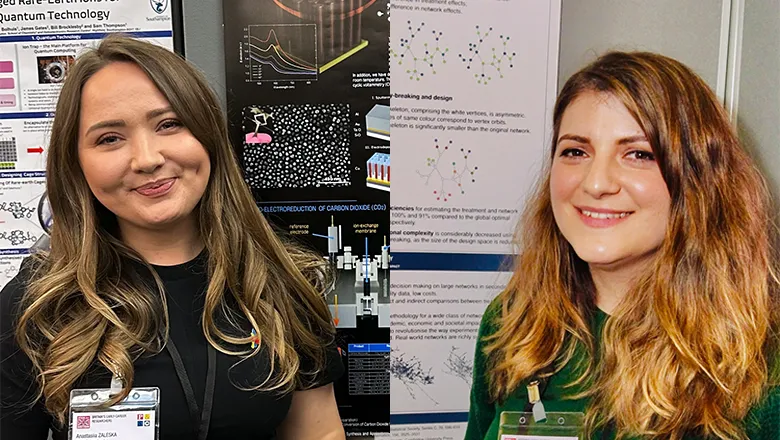Being selected as a finalist for STEM for Britain 2023 is a great honor. It is incredibly inspiring to be part of such an important event and to have the opportunity to share my research with others who are passionate about STEM."
Anastasiia Zaleska, Research Associate, Department of Physics
20 March 2023
King's scientists present cutting-edge ideas to Parliamentary and Scientific Committee
The researchers presented to MPs at the prestigious STEM for Britain competition

King’s scientists presented their research to the Parliamentary and Scientific Committee earlier this month as part of the annual STEM for Britain competition.
Dr Anastasiia Zaleska, from the Department of Physics, and Dr Vasiliki Koutra, from the Department of Mathematics, discussed their research, including how nano-materials can help reduce CO2, and how new methodologies can improve the dissemination of key information to people via networks.
A major scientific poster competition and exhibition held in Parliament since 1997, STEM for Britain is open to early career researchers engaged in scientific, engineering, technological or medical research. The competition sheds light on cutting-edge work for parliamentarians in non-technical language.
Focusing on how light-harvesting nanomaterials – materials shrunk to down to the size of atoms - can be used to drive the reduction of CO2 emissions, Anastasiia’s research explores how new, sustainable approaches to chemical reactions can help solve the climate crisis.
Vasiliki's work looks at developing a methodology to improve experiments on networks, ie groups of interconnected people or things. These experiments range from looking at how best to understand the impact of adverts in a social network and make the adverts more viral, to assessing the effectiveness of a public health campaign in a group of hospitals. Vasiliki's methodology aims to improve the efficiency of network designs for obtaining valid conclusions from the data gleaned in these experiments. Information from such experiments can feed into decision making to respond to vital, real world scenarios.
By presenting this work in laymen’s terms, STEM for Britain hopes to stimulate STEM professionals and the general public alike to close the perceived gap between scientific research and the rest of society.
I’m pleased to be part of an event which stands at the intersection between policy and science. It was a privilege to have the opportunity to explain the importance of statistical methodology in modern society and to make my own contribution towards raising the visibility of women in science.”
Vasiliki Koutra, Research Associate, Department of Mathematics
In addition to the Parliamentary and Scientific Committee, STEM for Britain is supported by a range of scientific, engineering and mathematics bodies across academia. The Institute of Physics and Council for the Mathematical Sciences among others lend their support alongside United Kingdom Research and Innovation, Dyson Ltd and other public and industry partners.


